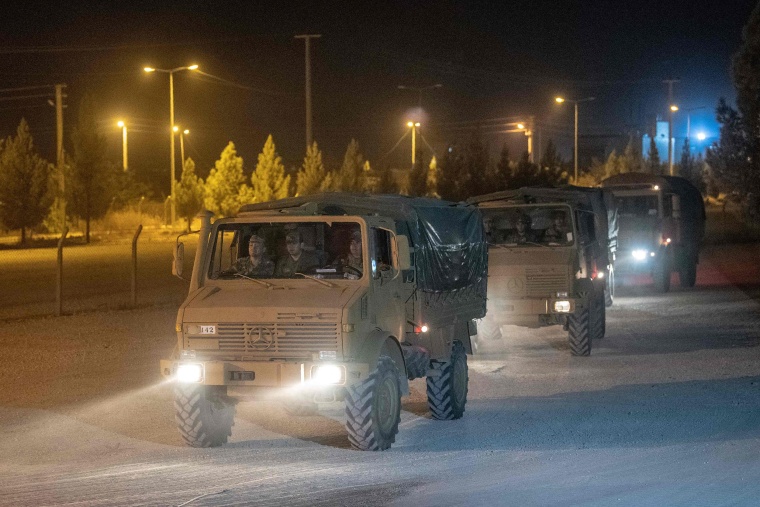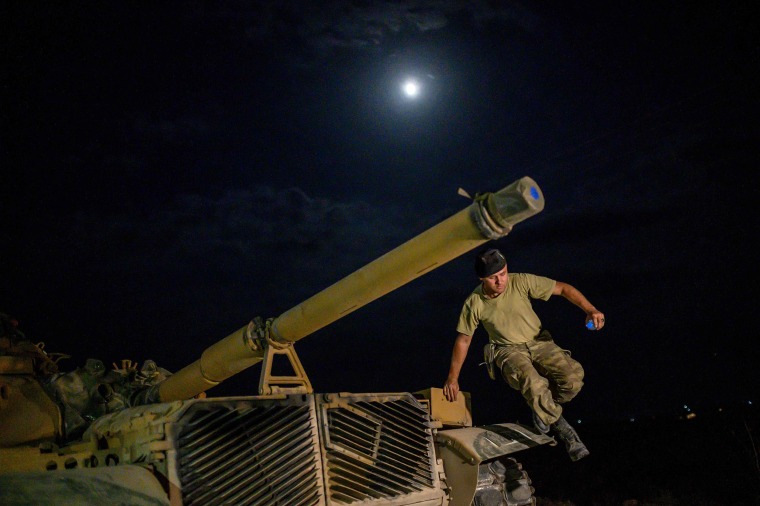LONDON — The Kurdish-led Syrian Democratic Forces issued a “public mobilization” call along the Syrian border with Turkey on Wednesday as tensions ratchet up in northeastern Syria in the face of an imminent Turkish invasion.
“We are and we have to be prepared for the worst,” Syrian Democratic Forces (SDF) spokesperson Mustafa Bali told NBC News. “The situation on the border is like a volcano and can explode at any moment.”
The call for mobilization came as pictures appeared to show Turkish tanks and military personnel amassing on the Syrian border awaiting a call to cross into Syrian territory.
A top Turkish official, Fahrettin Altun, said Tuesday that Turkish troops and allied Syrian rebel forces would “shortly” cross into northeastern Syria. Their aim, he wrote in a Washington Post Op-Ed, was to “neutralize” a longstanding threat against Turkish citizens and to “liberate” the local population.
The escalation comes three days after the White House announced that it would pull back troops from northeast Syria to make way for a long-planned Turkish operation. The White House said Turkey would now be responsible for all captured ISIS fighters in the area.
The announcement brought a wave of criticism from around the world, including from Republicans as well as Democrats in the U.S., that the American government was abandoning its Kurdish allies.
The SDF has been a crucial U.S. ally in the war against ISIS and currently controls much of the area close to the border with Turkey. It says its forces have lost 11,000 fighters in that struggle.
Overnight, as Kurdish fighters braced themselves for a Turkish invasion, the SDF reported that ISIS sleeper cells had launched three attacks on its security bases in the city of Raqqa. NBC News could not independently confirm the attacks.
Reports of the attacks followed a warning from a top Kurdish general on Monday that fighters assigned to guard thousands of ISIS captives were rushing to the border ahead of an expected Turkish attack. It also came after analysts told NBC News that the withdrawal of U.S. troops from the area and a Turkish invasion would be a “godsend” for the Islamist militants.
"ISIS is no more the priority," Bali said. "We fought ISIS for years; now we have to look after ourselves."

The SDF called on the international community on Wednesday to implement a no-fly zone over the area to protect civilians from attack, similar to what was done for Kurds in Iraq. In 1991, the U.S. enforced a no-fly zone over northern Iraq to protect the Kurds from a brutal crackdown by Saddam Hussein’s armies.
In a separate statement it called on the international community and all countries in the international coalition against ISIS to “carry out their responsibilities.”
“The border areas of northeast Syria are on the edge of a possible humanitarian catastrophe,” the statement said. “This attack will spill the blood of thousands of innocent civilians because our border areas are overcrowded."
An SDF official, who spoke on the condition of anonymity out of safety concerns, told NBC News on Tuesday that its fighters expect Turkish-aligned Islamist factions to enter Syria first, followed by the Turkish military.
Turkey, which sees the Kurdish-led forces as terrorists who threaten the integrity of its country, used a similar tactic when it moved into the Kurdish-enclave of Afrin early last year, displacing some 300,000 people.

